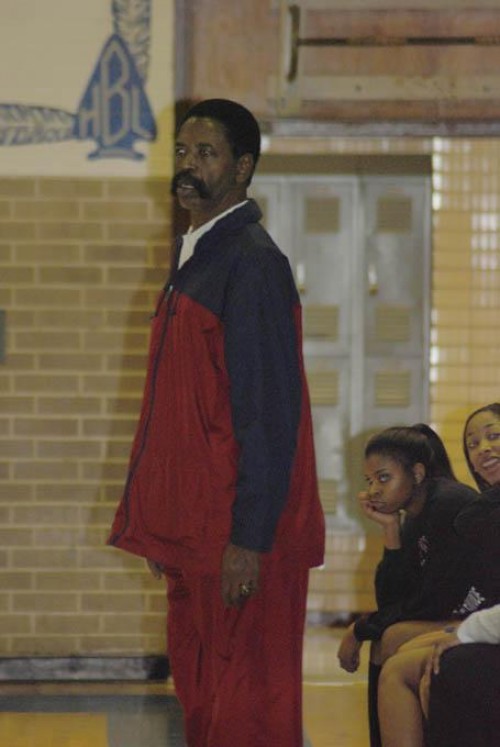
Felton Davis, Sr.
December 10, 2007Striking a balance to fund our roads
December 12, 2007Kenneth Dixon is no stranger to victory.
The girls’ basketball coach has more than 400 of them through 15 seasons at the helm of the Ellender Memorial girls’ basketball team.
During his tenure, he’s also led the Lady Patriots to 12 district titles and four state championships in six appearances.
The SportsNet met with Dixon to discuss what makes a true winner.
Sports Net: How did you first land the head coaching job with the Lady Patriots?
Kenneth Dixon: I took over in 1992. The principal over here, who at that time was Mr. James Charles, called my father-in-law, who was Gus Brown. Gus was also a principal here (Ellender) at one time. Charles needed a coach and my father-in-law told him ‘I have a man in mind for you right now.’ But at that time I didn’t want to coach anymore. My father-in-law told me to ‘just talk with him (Charles).’ I told him I’d come in and help out for a year.
SN: How old were you then?
KD: I was 42, and done some coaching before. I told Charles OK, I’ll give it a chance. I really get involved in coaching head-over-heels, and I wasn’t sure I was ready to commit at the time.
SN: What made you stay?
KD: The thing that really made me commit was the young ladies here. Between games, they would study. That was what impressed me the most. I had coached boys’ teams in the past, and it was always devastating to have a star player declared academically ineligible. But this girls’ team impressed me. They were very smart and the team had a lot of academic all-staters. So I said, ‘Well, my time is worth it.’ To me, it’s a waste of my time if we’re practicing hard and working in the gym and at the end of the semester you can’t play because of your grades. But these ladies impressed me academically and made me want to coach girls over boys. (Laughs)
SN: So they were good in the classroom, but how were they on the hardwood that first year?
KD: They had talent, but were inexperienced. Juniors and seniors had talent, but they didn’t have the work ethic. They didn’t want to do anything in practice and just wanted to show up for the game. Once I realized we weren’t going to win a particular game, I’d clear the court, pull the upperclassmen and put in my freshmen and sophomores because I knew I had to rebuild the program. In 1992 we finished 10-13. The following year we made the playoffs, in third place in the district at 16-11. We ended up tied with Terrebonne High and were a Wild Card team. Then we ended up playing O.P. Walker, which was ranked No. 1 or 2 in the state, and we upset them in the bi-district round of the state playoffs. But then we lost to Salmon in the regional round. And this was with those original freshmen and sophomores that we were bringing up.
Then, in my third year in 1994-1995, we were district champions.
SN: And things have obviously been pretty great since then.
KD: We’ve won 12 district championships and four state championships since then.
SN: Is there a secret behind turning a team into a powerhouse?
KD: Just hard work and working constantly. The kids have ability, but we (coaches) just have to provide them with the opportunity to improve their game. You have to study hard, of course, and you have to have a good support staff around you. So yeah, it’s a lot of hard work. But you have to meet all of the needs of the players and you have to solve their problems.
SN: Anything else?
KD: A good feeder-program, and we have one of those right now with Oaklawn Junior High and Grand Caillou Middle. It’s getting a little soft right now though, and we’ll have to go back and fortify it. We only got one freshman between the two middle schools, and that’s a big concern.
SN: And unusual, considering you are coming off a state championship season.
KD: Absolutely. That’s what I’m thinking. But they supposedly have three to four eighth graders that are there now who can play. But what are we supposed to do this year? We’re used to getting at least three to four players a year that play on the varsity as freshmen. This is trouble.
SN: What’s your background in hoops? Are you a former player?
KD: I’m a graduating player of Southern University in Baton Rouge. I was just a player, not a starter.
SN: What position?
KD: I was a 6-foot-3 forward, which wasn’t a big deal considering that most forwards were 6-foot-8 or 6-foot-9.
SN: What about your coaching background? Where did you coach before coming to the Lady Patriots?
KD: Bunkie High School in Central Louisiana under coach Frank Snyder, and then I moved to Houston, where I was an assistant coach at Milby Senior High. The Ellender job was my first head coaching position.
SN: Now that you’re a head coach, how much time do you spend on the hardwood each week?
KD: Three hours a day, six days a week.
SN: That’s 18 hours. People probably don’t realize that you spend even more time dealing with basketball than that.
KD: I make a lot of notes and write stuff down so I don’t forget it. I evaluate practice schedules and think about certain drills that I need to improve.
SN: So being a high school basketball coach is really a full-time job.
KD: It should be – at least if you want to be successful each year. Absolutely.
SN: You’ve dedicated a lot of time to winning, but do you enjoy any hobbies on the side?
KD: Just relaxing and taking part in my other kids’ lives. I have three children (all boys), two grandchildren (a boy and a girl). I always try to follow what they’re doing. The youngest son is a basketball player on the boys’ team. The other two were football players.
SN: Care to come clean about any embarrassing tidbits of information that might not be of public knowledge?
KD: (Laughs) You’re good. No, not that. Not too much. I can’t think of really anything right now. You’re catching me on the spot. I just have to realize what good coaches do and try to do the same thing. What do some of the coaches of the best programs in the country do to win? I have watched some of the great coaches at Ellender with the boys’ programs. Ernie Brown used to be coach here, and I’ll call him and ask him what he’d do. So I have a lot of great mentors.
SN: Read a lot of books on coaching as well?
KD: I try to. I’ve heard a lot of great coaches speak and try to attend great camps – Ernie and I. Mike Krzyzewski, Bobby Knight, Dean Smith, John Cheney, John Thompson – I’ve heard all of them speak. I’m even at all of Nicholls’ and all of LSU’s camps.
SN: How special was last year’s team? Was it one of the best you’ve ever coached?
KD: I’ve had better. (Laughs) It was a great team, but we’ve always had a great team here. On the 1998 state championship team, we had five starters that all played at college (it was our first one). That team was awesome – very competitive. Last year’s team was great, but I don’t know how good this year’s team can be. The question is still out. Maybe it’s just me being impatient. I lost two, but return four starters. With me, with the system, I have to be patient and let them do what they’re doing.
SN: What made it particularly good?
KD: Physical ability. That’s the strong point. But right now we’re still weak on leadership. We’re still looking to find who wants to take over and lead. Hopefully we’ll get to that point. But these girls remind me of past teams in terms of talent. We have five players who can score in any position. We’re weak on coming off the bench though.
SN: What has been the most fulfilling part of coaching the Lady Patriots?
KD: Seriously, it’s seeing them graduate from college and return to the program. Nothing affects me more than that. I saw four to five former players come see us play against Terrebonne High (last week). Stuff like that makes me feel that the work was worth it. They all come back to see the team and cheer the girls on.
SN: Almost as if they are still part of the program.
KD: Yes. Absolutely. That’s correct. They want to let them know that all they have to do is continue to work hard, because they themselves have been in the same position at one time. And to see that is fulfilling.
Kenneth Dixon follows the action as his Lady Patriots run the floor at the Casey Kozminiski Tournament, held last week at H.L. Bourgeois High School. (Photo by CHRIS SCARNATI
- Tri-Parish Times)














